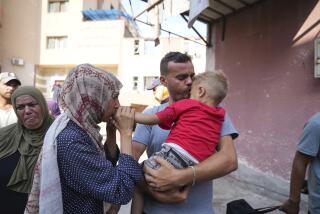Wounded Leave Croatia on Mercy Flight : Balkans: Eight Bosnian war victims will be first to receive medical treatment in the U.S. The mission is tinged with sadness as relatives watch them go.
- Share via
ZAGREB, Croatia — When a white jet lifted off from the runway and gently faded into the cloud cover Tuesday, Mevlida Muratovic lost control of her stifled sobs and a sympathetic hush fell over the crowded cafe from which she watched the takeoff.
It was a mission of mercy that swept her husband and son toward safety and healing at a Cleveland hospital, but the altruistic act also extinguished the last two lights in Mevlida’s sorrowful life.
Ferid Muratovic and his 14-year-old son, Malik, could be said to be among the lucky ones--the first eight Bosnian war victims evacuated to the United States for medical treatment unavailable in their ruined homeland.
But for Mevlida, matron of a Slavic Muslim family decimated, displaced and now divided by war, the shepherding of her remaining loved ones to distant security felt more like another devastating blow.
“I’m trying to be happy. I know they are safer now,” said the 33-year-old Bosnian refugee, her face blotched and contorted with anguish. “But it’s so hard. Now I’m alone and I don’t know when I will see them or hear from them again.”
A Serbian artillery barrage shredded the Muratovics’ 8-year-old son before their eyes while the family fled their hometown north of Sarajevo in early August. Mevlida’s sister and parents had been killed two months earlier by the Serbian rebels applying their savage practice of “ethnic cleansing” to the city of Foca.
Since the Muratovic home in the town of Olovo was leveled by the Serbian onslaught, Mevlida and the other wounded survivors of her family had been moving with Bosnia’s ever-swelling tide of wandering homeless from one wretched refuge or hospital to another.
The Muratovic family’s tragic tale is just one of the hundreds of thousands proliferating in Bosnia-Herzegovina as the 10-month-old siege of central Bosnia rages unabated.
It likely is not the saddest, but gradations of human misery are lost on victims such as Mevlida who feel fate has spared them only to endure something worse.
Less than half a year ago, Mevlida was a comfortable housewife taking care of two school-age boys while her husband earned a good living at the TAS automotive works near Sarajevo. They lived in a modern suburban home they had spent more than a decade decorating and improving.
The domestic tranquillity long taken for granted by the Muratovic family and others in Olovo ended Aug. 7 with a sudden storm of artillery from Serbian gunners embarked on a campaign to seize Bosnian land for the state of Greater Serbia that they seek to build from the broken pieces of the former Yugoslav federation.
Both parents and Malik were wounded by shrapnel in the blast that killed 8-year-old Nermin. The survivors spent the next three months being shuttled among overwhelmed doctors between their overrun town and Tuzla, one of the last major cities still under the Sarajevo government’s control.
In November, they were allowed through Serbian lines as part of a U.N.-escorted convoy of wounded headed out to any country that would take them.
Malik had lost an eye in the attack and had no hope of a transplant in besieged Bosnia, nor did surgeons in Croatia have the expertise for the needed operation.
The boy’s bleak prognosis was brought to the attention of humanitarian relief workers and eventually to the International Organization for Migration, which resulted in Malik and his father, who has shrapnel embedded in both legs, being among the first to be sent to the United States for treatment.
A white C-9 aircraft marked with a red cross and “United States of America” carried the Muratovics and six other patients aloft at 12:30 p.m. for an overnight stay at a U.S. Army hospital in Germany before they would head for Andrews Air Force Base in Maryland and distribution to facilities across the country for their specialized care.
Similar medical evacuation flights are planned twice a month to bring the neediest of Bosnia’s hundreds of thousands of wounded civilians to treatment.
U.S. Embassy press officer Susan Hovanec explained that patients are selected on the basis of recommendations from Croatian physicians as to who can best benefit from surgical procedures that are limited or unavailable here, such as plastic or reconstructive surgery, eye operations and prosthesis fittings.
Minor children, like Malik Muratovic, are allowed to be accompanied by one parent. In this case it was his father, since the 42-year-old auto worker also needs care.
The gouges in Mevlida’s torso inflicted by flying shrapnel have mostly healed in the intervening six months, so the homeless and penniless woman was compelled to stay behind. She planned to stay at a boardinghouse in the nearby town of Stubicke Toplice, where a local charity has rented a sparse room in which she can wait out the return of what’s left of her family.
“She has lost everything,” said Tajana Basic, a volunteer with the Croatian Rear Front charity that aids civilian victims of the 18-month-old Balkan war. “She had a nice life, but as with so many people, now it’s all gone.”
Basic drove Mevlida and a handful of other patients’ relatives to the airport to bid farewell to the evacuees, holding back tears of her own as the wives and mothers spread their hands on the cafe windows and watched the white jet until it had disappeared from sight.
More to Read
Sign up for Essential California
The most important California stories and recommendations in your inbox every morning.
You may occasionally receive promotional content from the Los Angeles Times.














